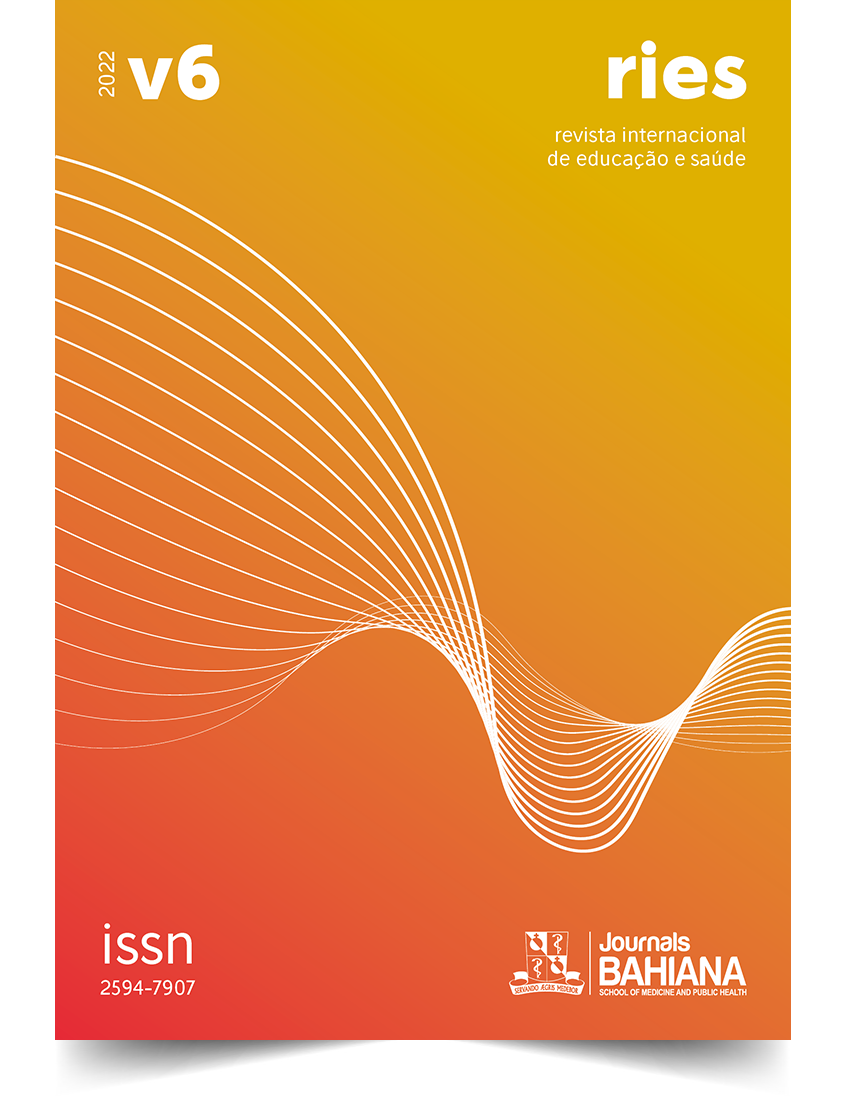Avaliação discente do “debriefing” na simulação em semiologia médica em um curso de medicina em Salvador/BA
DOI:
https://doi.org/10.17267/2594-7907ijeh.2022.e3136Palavras-chave:
Debriefing, Simulação, Educação Médica, EstudantesResumo
INTRODUÇÃO: Simulação é uma técnica utilizada para reproduzir situações do mundo real. Quando atrelada ao debriefing, este último possibilita que os estudantes realizem reflexões sobre o atendimento, tendo o professor como um facilitador do conhecimento. Neste sentido, a avaliação da técnica por parte dos alunos se faz de grande valia, possibilitando o aprimoramento do ensino e, consequentemente, das práticas na área de saúde. OBJETIVO: Avaliar o debriefing da simulação pelos alunos do curso de medicina. METODOLOGIA: Trata-se de uma análise observacional analítica/descritiva, de corte transversal, realizada nos anos de 2019 e 2020, a partir da Escala de Experiência com o debriefing aplicada a estudantes do curso de medicina de uma faculdade privada em Salvador - BA. Foram incluídos neste estudo todos os estudantes do 5º semestre de medicina do período 2019.1, que estiveram presentes no cenário “demência” da atividade de simulação do componente curricular “Semiologia Médica”. Foram excluídos, para a composição da amostra final, os questionários com preenchimento insuficiente com possível comprometimento da análise, na qual foram realizadas frequência e proporção de cada uma das quarenta variáveis. RESULTADOS: 109/110 alunos responderam de forma válida os questionários, sendo que na análise das práticas educativas através da Escala de Experiência com o Debriefing, entre 54,1 - 91,7% concordam totalmente com os vinte itens da escala e, entre 78,9 – 97,2%, afirmam a grande importância das respectivas etapas durante o debriefing. CONCLUSÃO: Os achados deste estudo demonstraram que o debriefing apresentou alta qualidade após as práticas educativas de simulação, na concepção dos acadêmicos de medicina.
Downloads
Referências
(1) Brandão CFS, Collares CF, Marin HDF. A simulação realística como ferramenta educacional para estudantes de medicina. Rev Sci Medica [Internet]. 2014;2 (2):187–92. Disponível em: http:// revistaseletronicas.pucrs.br/ojs/index.php/scientiamedica/article/view/16189/11485
(2) Gaba DM. The future vision of simulation in healthcare. Qualf Saf Health Care. 2004;13(1):2–10. https://doi.org/10.1136/qhc.13.suppl_1.i2
(3) Macieira LMM, Teixeira MDCB, Saraiva JMA. Simulação médica no ensino universitário de pediatria. Rev Bras Educ Med. 2017;41(1):86–91. https://doi.org/10.1590/1981-52712015v41n1RB20160032
(4) Oliveira SN, Prado ML, Kempfer SS. Utilização da simulação no ensino da enfermagem: revisão integrativa. Rev Min Enferm. 2014;18(2):496–504. http://www.dx.doi.org/10.5935/1415-2762.20140036
(5) Oliveira AR, Falcão ML. A simulação de atendimento como dispositivo de ensino-aprendizagem: um relato de experiência no serviço de psicologia aplicada (SPA) [Internet]. Anais do XV ENEXT/I ENExC; 2015; Recife, PE. [citado em 2022 jun.]. Disponível em: https://www.ufpe.br/documents/38978/1184596/2.pdf/19c92f82-86ed-4366-84cf-2e522afb71fc
(6) Brown DK, Wong AH, Ahmed RA. Evaluation of simulation debriefing methods with interprofessional learning. J Interprof Care. 2018;32(6):779-781. https://doi.org/10.1080/13561820.2018.1500451
(7) Rudolph JW, Simon R, Dufresne RL, Raemer DB. There's no such thing as "Nonjudgmental" debriefing: a theory and method for debriefing with good judgement. Sim in Healthc [Internet]. 2006;1(1):49–55. Disponível em: https://www.fhft.nhs.uk/media/2687/17-theres-no-such-things-as-nonjudgmentaldebriefing_rudolph-etal.pdf
(8) Scale DE, Na I, Comandos MI. Validação para a língua portuguesa da Debriefing Experience Scale. Rev Bras Enferm. 2016;69(4):705-711. https://doi.org/10.1590/0034-7167.2016690413i
(9) Reed SJ. Debriefing Experience Scale: Development of a Tool to Evaluate the Student Learning Experience in Debriefing. Clin Simul Nurs. 2012;8(6):211-217. http://dx.doi.org/10.1016/j.ecns.2011.11.002
(10) Allan CK, Thiagarajan RR, Beke D, Imprescia A, Kappus LJ, Garden A, et al. Simulation-based training delivered directly to the pediatric cardiac intensive care unit engenders preparedness, comfort, and decreased anxiety among multidisciplinary resuscitation teams. Journ Thorac Cardiovasc Surg. 2010;140(3):646–652. https://doi.org/10.1016/j.jtcvs.2010.04.027
(11) Timmis C, Speirs K. Student perspectives on post-simulation debriefing. Clin Teach. 2015;12(6):418–422. https://doi.org/10.1111/tct.12369
(12) Fey MK, Scrandis D, Daniels A, Haut C. Learning through debriefing: students’ perspectives. Clin Simul Nurs. 2014;10(5):e249–e256. https://doi.org/10.1016/j.ecns.2013.12.009
(13) Heukelom JNV, Begaz T, Treat R. Comparison of postsimulation debriefing versus in-simulation debriefing in medical simulation. Simul Healthc. 2010;5(2):91–97. https://doi.org/10.1097/SIH.0b013e3181be0d17
Downloads
Publicado
Edição
Seção
Licença
Copyright (c) 2022 Letícia Menezes Pacheco

Este trabalho está licenciado sob uma licença Creative Commons Attribution 4.0 International License.
Esta obra está licenciada com uma Licença Creative Commons Atribuição 4.0 Internacional.



